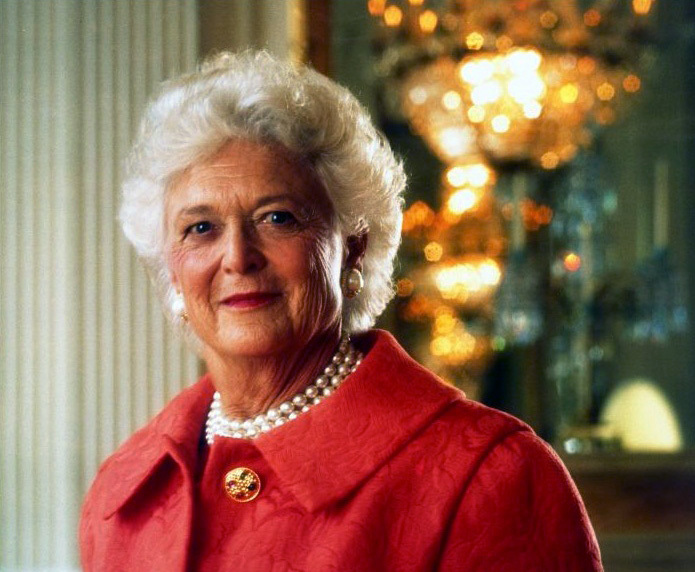Barbara Bush – A Lesson On Comfort Care

When word was released recently that Barbara Bush, wife of former President George H. W. Bush and mother of former President George W. Bush, was seriously ill and opted for “comfort care,” discussion arose regarding the meaning and uses of comfort care for end of life measures. Barbara Bush was suffering from congestive heart failure and advanced chronic obstructive pulmonary disease (COPD). She died shortly after.
One of the controversies surrounding comfort care comes about when it is discussed as the end of treatment or as giving up. Advocates note that comfort care does not mean the end of medical treatment or medical help. It could be described instead as discontinuance of what have been considered aggressive measures or heroic measures to sustain life at all costs and regardless of consequences and instead substituting for it what is known as palliative care. It does not mean discontinuance of all medications but instead using medications and medical care generally to relieve pain and discomfort for the person who is undergoing advanced illness. Sometimes after opting for comfort care patients also have recovered.
Palliative care has been described as “an approach that improves the quality of life of patients and their families facing the problem associated with life-threatening illness, through the prevention and relief of suffering by means of early identification and impeccable assessment and treatment of pain and other problems, physical, psychosocial and spiritual.” Comfort care is probably not considered early enough in many cases.
One article from a respected healthcare reporting resource, Kaiser Health News, notes “<t>he announcement <to focus on comfort care by Barbara Bush> came amid a national effort to define and document patients’ wishes, and consider alternatives, before they <the patients> are placed on what has been described as a ‘conveyor belt’ of costly medical interventions aimed at prolonging life,” https://khn.org/news/barbara-bushs-end-of-life-decision-stirs-debate-over-comfort-care/. April 16 was National Health Care Decisions Day, a day set aside in the US to consider these kinds of issues in individual cases.
When clients come to me for Health Care Powers of Attorney and Living Wills they could be said to be almost evenly divided between those who are concerned that the documents will encourage their agents, the people they appoint, to act too quickly and to discontinue life support when they would have had a chance to recover and those, usually clients who have experienced extended time frames for family members who suffered too much for long, who are worried that their agent will refuse to let them go when the time comes. Sometimes people will say as if thinking out loud, “I cannot appoint <a close relative> because he or she will not be able to make the decision either way when the time comes.”
Regardless of the decision, people should discuss with the person who would be their decision maker what their wishes would be. I have sometimes heard people appointed as health care agents say they are grateful their loved one provided a
Living Will or described their wishes in advance. It gave the person who needed to act a feeling of peace he or she was following that person’s wishes.
Several advocates in the field of healthcare decision making spoke favorably in the Kaiser Health News article of the announcement the Bush family made as a means of opening dialogue on end of life treatment and comfort care.
Dr. Haider Warraich, a fellow in cardiovascular treatment at Duke Medical Center and author of a book on the subject noted that for heart failure patients, comfort care can mean opting not to use a breathing machine or CPR from the first aid training but patients can continue to receive medical treatment including morphine to ease shortness of breath and diuretics to remove excess fluid from the lungs.
Ellen Goodman, co-founder of the “Conversation Project” which encourages families to discuss and document end of life preferences is reported to have said of Barbara Bush “It sounds like this forthright, outspoken woman has made her wishes known and the family is standing by her…”
Nathan Kottkamp, founder and chair of National Healthcare Decisions Day is noted to have said “It’s a personal decision that she didn’t have to share, but hopefully it will encourage others to think about their choices, talk about their choices, document their choices and have those choices honored…”
About the Author Janet Colliton
Esquire, Colliton Law Associates, P.C. Janet Colliton has practiced law for over 38 years, 37 of them in Chester County, Pennsylvania, a suburb of Philadelphia. Her practice, Colliton Law Associates, PC, is limited to elder law, Medicaid, including advice, applications and appeals, and other benefits planning including Veterans benefits, life care and special needs planning, guardianships, retirement, and estate planning and administration.
